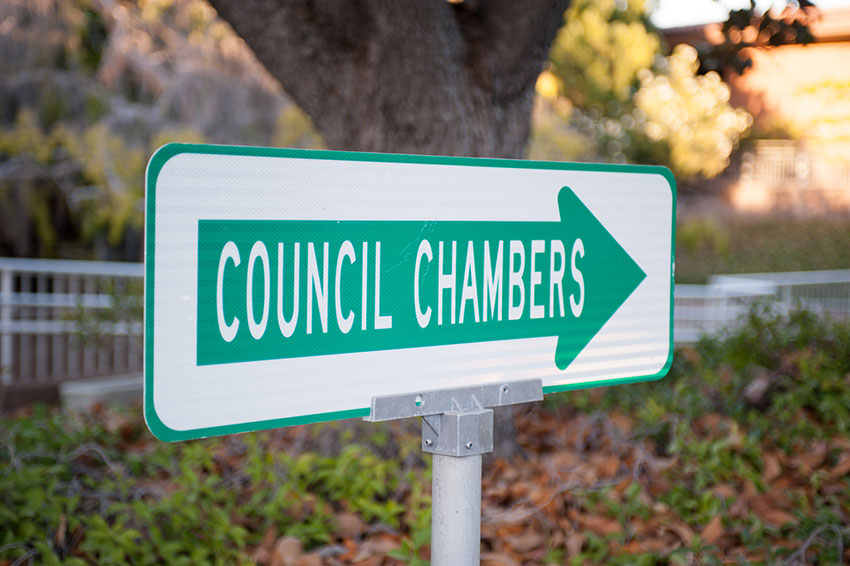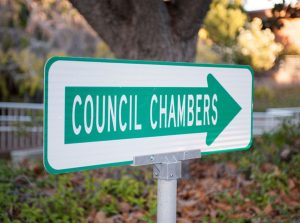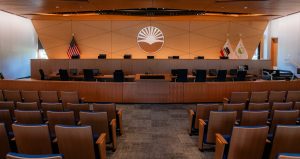In a seven-hour virtual meeting that was fraught with technical problems — starting with the City website going down mid-afternoon — the Santa Clara City Council took one action at its Dec. 15 meeting: Continuing the entire agenda to Dec. 16.
But it wasn’t technical problems bringing the meeting to a standstill.
It was a complaint from Bob O’Keefe, recent candidate for District 5, that the published meeting agenda didn’t comply with the Americans With Disabilities Act and thus violated California’s open meetings law, the Brown Act. All agendas were missing the information since early this month when the City went to all-remote meetings.
The deficiency was that the agenda template for the all-virtual meeting didn’t include information on how to get disability accommodation for attending meetings.
O’Keefe communicated this in an email sent earlier that afternoon, although the agenda was published on Dec. 11. Assistant City Clerk Nora Pimentel read the information at the meeting’s start and posted a notice on the meeting screen.
O’Keefe wrote that he noticed the omission while preparing his comments on a closed session item about the City’s appeal of the voting rights lawsuit it lost in 2018.
“It would ironic, hypocritical and unlawful to proceed with that item, which deals with the City violating the California Voting Rights Act [CVRA],” O’Keefe wrote, “during a meeting that violates the Americans with Disabilities Act. It also exposes the City to civil liability and litigation.”
City Attorney Brian Doyle affirmed that the meeting notice wasn’t compliant, but that the Assistant Clerk had corrected it. “The issue of whether or not to cancel the meeting or the closed session item,” he said, “is whether anyone …who had rights under the ADA was unable to obtain that accommodation because of the defect in the notice.”
The Council could hear items and take action, Doyle said, but if someone came forward saying they had been prevented from speaking because of the omission, “it’s possible a court would say, ‘you need to redo that action.'”
The next two hours of discussion about whether the meeting should be held at all, with the discussion circling around three options: rescheduling the meeting for the next day, conducting the meeting but continuing any actions to the next day’s meeting, or doing business as usual and repeating any actions at a later meeting if anyone complained.
Discussion centered on whether the Council should hold the closed session to discuss the California Voting Rights Act (CVRA) lawsuit appeal, or, if the discussion was held, whether any action should be postponed to the Wednesday meeting.
Councilmember Kevin Park said that he thought the CVRA appeal was very time-sensitive and couldn’t be postponed. In addition to the fact that the court hearing is Thursday, Park reported that he had been contacted by the plaintiffs’ attorney, Robert Rubin.
“I was told this is time-sensitive,” Park said. “Knowing that there is new information out there, I think this issue needs to be discussed.”
“Why is the plaintiffs’ attorney contacting our Council when we’re about to go into closed session?” said Councilmember Kathy Watanabe. “Why doesn’t Robert Rubin contact our City Attorney?”
“I was told this information was given to the City,” Park replied. “If the City does know about communications or issues that we need to discuss, I would like to know about it.”
Rubin confirmed to The Weekly that he has communicated with the City’s outside counsel, Steve Churchwell, with new information on the case.
In the end, the Council voted 5-2 to hold the closed session and continue the rest of the agenda to Wednesday, with Mayor Lisa Gillmor and Watanabe opposing.
This is the second meeting where a roadblock was set in the way of discussing the City’s CVRA lawsuit appeal; which Councilmember Raj Chahal first requested for the Dec. 8 closed session.
At that meeting, Doyle blocked the lawsuit discussion, claiming that because he had publicly stated that the appeal should be dropped, the new City Councilmembers had a conflict of interest and couldn’t participate in any discussions or vote on the issue.
Further, Doyle falsely said that they had taken money from the 49ers — who have publicly favored the City’s six-district election system — which was a further conflict of interest.
The 49ers made no direct donations in the recent election. Even had they had done so, campaign donations are exempted from California’s conflict of interest rules.












0 comments